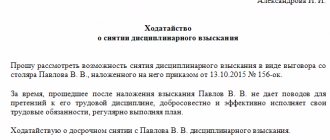The director of the organization is the financially responsible person. That is, damages can be recovered from him legally. How to do it? Let's look at it in this article.
Question: Is it possible to recover losses from the former director of an LLC in the form of fines and penalties accrued based on the results of a tax audit? Is it possible to recover damages in the form of administrative fines collected from the LLC (in particular, for violation of labor or migration laws)? At the same time, the former director has no personal interest or intent. The reason may be incorrect reflection in accounting, incorrect wording, or failure to complete documents (including by other employees of the organization reporting to the director). View answer
What kind of damages can be recovered?
Collection from the general director is carried out on the basis of paragraph 1 of Article 53.1 of the Civil Code of the Russian Federation. Instructions that damages can be recovered from the director are contained in the laws on LLCs and JSCs. However, this does not mean that any costs can be recovered from the responsible person. This can only be done in relation to expenses incurred through the fault of the general director.
How to recover losses from the director that the organization incurred due to his fault ?
This person has broad powers and is responsible for almost all areas of the company's activities. Therefore, the list of damages that can be recovered is quite wide. Consider this list:
- Transfer of money under fictitious agreements for cashing out finances.
- Placing signatures on acts of services provided, if these services were not provided.
- Unlawful increase in salary, illegal payment of bonuses.
- Exceeding the powers specified in the charter.
- There is no information about the spending of money that was taken into account.
- Purchasing property at an obviously inflated price.
- Sale of property at a reduced cost.
- Due to the fact that the general director did not transfer the documentation, the company incurred expenses for restoring accounting.
- The company fulfilled its obligations under the contract, which was not necessary.
- As a result of the tax audit, additional charges appeared or sanctions were imposed.
- The legal entity was brought to justice on the basis of the Tax Code of the Russian Federation or the Code of Administrative Offenses of the Russian Federation.
- Losses that occurred during the activities of the company under the management of this general director.
Question: Can LLC participants recover damages from the general director that arose in connection with his refusal of the organization’s claim? View answer
These are the most common types of losses, confirmed by judicial practice. Other types of losses are also possible. However, collecting these funds will be more difficult due to the lack of judicial practice.
IMPORTANT! Claims regarding losses can be brought not only against the general director, but also against a member of the company’s board of directors. They can also be addressed to members of the board of a cooperative or the manager of a unitary entity.
ATTENTION! The term “director” is disclosed in the resolution of the Plenum of the Supreme Arbitration Court No. 62 dated July 30, 2013. This is a fairly broad concept. It includes not only the CEO. This could be, for example, a member of the board of directors. However, in Russia, in most cases, management functions are assumed by one person - the general director. As a rule, it is he who concludes transactions and puts his signatures on key documents. And therefore, losses are recovered from him.
In what cases should you go to court?
The CEO bears full responsibility. The basis is Article 277 of the Labor Code of the Russian Federation. Simply put, the CEO is obliged to compensate for all losses. The amount of compensation does not depend on the manager’s salary or the actual period of tenure as director.
However, compensation for losses can only be achieved when all the conditions for this are in place. In particular, it is necessary to prove the fact of causing the loss and its size. The basis is paragraph 2 of Article 15 of the Civil Code of the Russian Federation. But it is not always possible to accurately determine the amount of losses. But this, in accordance with paragraph 1 of Article 15 of the Civil Code of the Russian Federation, cannot become a basis for refusal to initiate a lawsuit. If the amount is unknown, it will be determined by the court based on all the circumstances. In this case, the principle of fairness is used.
The plaintiff must take into account that only actual damages can be recovered. Lost profits cannot be recovered. The corresponding rule is contained in Article 238 of the Labor Code of the Russian Federation. Let's look at an example. At the initiative of the general director, a deal that could have brought 500,000 rubles was terminated. This half a million cannot be recovered.
If a company suffers a loss, it can be compensated in various ways. You can either file a claim against the director, or make claims against suppliers and other participants in the transaction. If one of the refund methods has already been implemented (for example, the product was returned), it will not be possible to recover funds from the manager.
General provisions for the recovery of damages from a former director
The basis for collecting damages from the former director of the enterprise is clause 1 of Art. 53.1 of the Civil Code of the Russian Federation. According to it:
- Losses may be recovered from a person who is authorized to act on behalf of the enterprise by law, regulation or charter. Thus, the concept of “director” in this case also includes a person acting as a director, a management organization, members of the board of directors, members of the management board, etc. (clause 1 of the resolution of the Supreme Arbitration Court of the Russian Federation “On some issues of compensation for losses...” No. 62, hereinafter referred to as the decision of the Supreme Arbitration Court).
- Liability in the form of recovery of damages arises if the director is at fault if evidence is presented that he acted in bad faith or unreasonably, including when his inaction or actions did not follow from the usual conditions of civil transactions. Below we will look at each of these cases in more detail.
- Losses can be recovered at the request of a legal entity represented by its new director or bankruptcy trustee, participants (founders) of the legal entity. At the same time, a participant in a legal entity acts in the interests of the enterprise, and the fact that at the time the director committed actions that resulted in losses, this person was not yet a participant cannot become a basis for refusing a claim (clause 10 of the SAC resolution).
Recovery of damages is only one of the types of liability to which the director of a legal entity may be held.
Responsibility of the LLC CEO from 2021 Read more
Statute of limitations on the case
The statute of limitations for cases of collection of funds from the general director is standard. This is 3 years (based on Article 196 of the Civil Code of the Russian Federation). Article 197 of the Civil Code of the Russian Federation states that the standard period is valid in all situations unless separate regulations apply to them.
This period is determined not from the moment of the violation committed by the manager. It is counted from the date on which the loss became known. As a rule, a violation is detected when the director is replaced or the statements are approved.
In most cases, claims against the general director are filed in court when the employment relationship with him has already been terminated. However, penalties can be brought against the manager even if he continues to work in the company.
IMPORTANT! The general director may be held not only financially liable, but also criminally liable. The corresponding provision is contained in Article 90 of the Code of Criminal Procedure of the Russian Federation.
Assessing business prospects
The grounds for recovery are the presence of evidence that the loss arose as a result of dishonest or unreasonable actions of the general director or his inaction. That is, it is necessary to establish either the fact of bad faith, or the fact of unreasonable actions, or the fact of inaction. However, “bad faith” and “unreasonableness” are rather vague definitions. Let's look at what exactly is meant by them.
Signs of a CEO’s dishonesty:
- There was a conflict between the interests of the manager and the interests of the legal entity.
- The manager hid information about the completed transaction from the legal entity or provided false data.
- Conducting a transaction without approval, if it is required on the basis of laws or charter.
- The director, removed from his position, does not transfer documents to the legal entity, which leads to a loss.
- The general director, taking actions, understood that they were contrary to the interests of the legal entity. For example, he made a deal on obviously losing terms.
Actions are considered unreasonable in the following situations:
- Making an important decision in the absence of relevant information that matters.
- The director did not take action to obtain information necessary for business activity.
- A transaction without performing procedures that are required either by law or by business practice.
The lists under consideration are not exhaustive, and the court may find other actions unreasonable or unconscionable.
FOR YOUR INFORMATION! Cases related to collection have an interesting nuance. In particular, the burden of proof lies not with the plaintiff, as usual, but with the accused. If the director does not explain his actions in any way to the court, this may be considered bad faith. That is, he cannot simply refuse to testify.
The procedure for collecting losses from the director of the company
In most cases, recovery of damages from the CEO is carried out after he has left his post. Regardless of whether the manager left on his own or was forcibly dismissed. To do this, you must submit an application to the arbitration court, whose competence includes consideration of issues of this kind. The applicant may be a meeting of shareholders (participants, founders), the sole shareholder (participant, founder) or a new manager. To obtain compensation for a debt, it is necessary to prove that the manager’s actions that caused the loss were unreasonable or in bad faith. The burden of proof falls on the applicant, so the process of preparing documents must be treated with special attention. It would be wise to hire an arbitration lawyer who has experience in this type of litigation matters. If the former manager can explain his actions, or point out the reasons that led to losses and were beyond his competence, then with a high degree of probability he will be able to avoid imposing a penalty.
How to recover damages from the CEO
Let's consider the general procedure for collecting losses from a director:
- Drawing up a claim, which sets out all the circumstances of the case, argues the plaintiff’s position with references to the laws. In the application, it is advisable to indicate the amount of loss, as well as justify its calculation.
- Collection of documents that confirm the position of the plaintiff (for example, a document on the conclusion of a transaction due to which the legal entity suffered losses).
- Payment of state duty.
- Submitting a claim, documents and a receipt for payment of fees to the court at the defendant’s address.
The success of the trial is determined by the arguments presented by the plaintiff. If it is found unconvincing, the case is terminated.
Recovery of damages from the director: judicial practice
Judicial practice is full of cases in which the issue of collecting damages from an authorized person at the head of an organization or company, namely a director, appears. If the head of a company acts against the public interest, can damages be recovered from him?
The legal rules are as follows.
The current legislation (Civil Code of the Russian Federation) states the following: an entity acting on behalf of a legal entity is obliged to compensate for losses upon request emanating from the same legal entity or its investors, superiors, if damage has been caused or its interests have been violated.
It is easy to classify dishonest actions or inactions. The fact will be proven provided that the head of the organization gave a report on the consequences of his actions or realized that the decisions he made were contrary to the interests of the company. Such situations include the completion of a transaction, the terms of which are unfavorable for the legal entity.
How to challenge a deal on unfavorable terms in court?
The judicial definition of a disadvantageous transaction is as follows: the cost of the transaction and the terms are significantly worse than the terms of transactions concluded in other circumstances (drawing up an ordinary contract). In other words, the director makes a relatively worse decision than usual.
If a manager abuses his official duties, the consequences of his actions will be the infliction of public losses, measurable in monetary terms. Employees' wages will be harmed without explanation for such actions.
But current legislation provides for the protection of the rights and interests of the manager. The actions of the director of the company do not entail administrative and criminal liability under the following conditions:
- it will be established that the unfavorable deal concluded was part of multiple transactions, the results of which should have been profit for the company;
- it will be established that the unfavorable deal concluded protected the interests of the company, preventing even greater losses.
In contrast, there are situations where the manager is held accountable.
Concluding a deal on extremely unfavorable terms.
This includes cases when the head of an organization irrationally manages the company’s funds, and the injured party is the organization’s employees or partners (purchase of real estate at an excessively reduced cost, purchase of unprofitable shares, etc.).
Concluding transactions with affiliates.
Transactions concluded by the manager may have unpleasant consequences for the legal entity.
Let's consider an example: a director, while in office, entered into a purchase and sale agreement with a legal entity, where he also acts as both the founder and manager.
The violation lies in the fact of the transaction itself, since the conflict between the interests of the seller and the buyer prevails. The manager is interested in the buyer concluding the deal, despite the possible loss to the latter.
Exceptions are situations where the conflict of interest is resolved prematurely in compliance with all legal aspects. And then the manager will not be held accountable for his actions.
Violation of deadlines for submitting reports to the tax office, falsification of information, and gross errors in documentation.
The director, as an authorized person, is required to pay taxes by filing appropriate income reports. Violations in documentation, missed deadlines or falsification of information will be grounds for prosecution.
Money transfers or transfer of property rights without legal basis.
Any monetary transactions made unilaterally (without a guarantor of return of funds or further profits of the company) are regarded as a gross violation and moderate damage to the organization.
A manager can be held accountable if he conceals from his partners or investors the fact of carrying out monetary transactions or transferring property important to the company.
To hold a manager accountable, several conditions will need to be met for the court to accept the claim for consideration:
- actual proof of the director's guilt. The manager must be aware that his actions (or inactions) harm the interests of the company and have negative consequences;
- actual evidence of damage caused;
- factual evidence of the relationship between the actions of the manager and the losses caused. It will be necessary to restore the chronology of events.
In judicial practice, there are cases that cannot be quickly classified, but the court may recognize them as dishonest actions on the part of the head of the organization.








